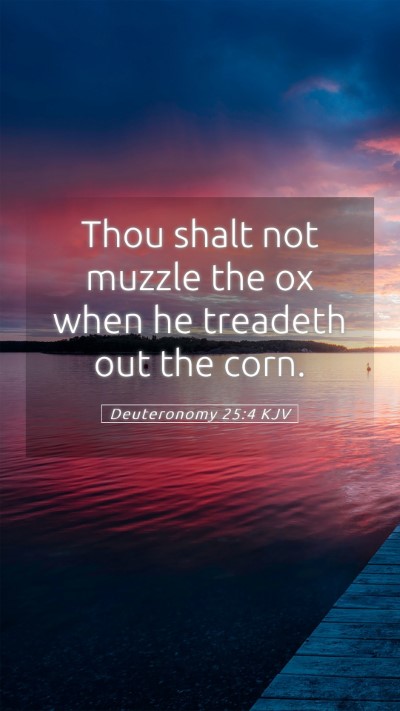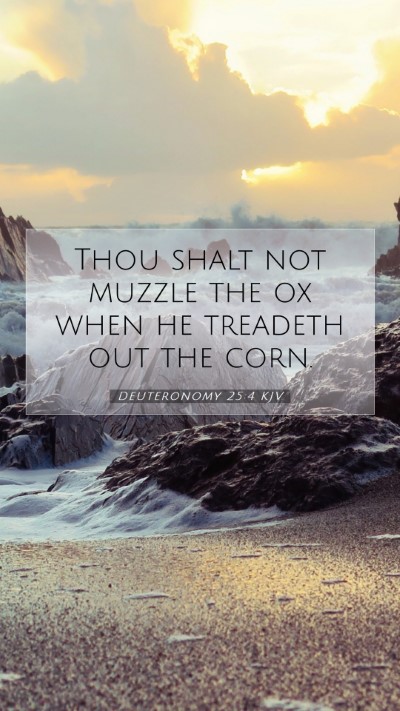Understanding Deuteronomy 25:4 - Bible Verse Meaning and Interpretations
Bible Verse: Deuteronomy 25:4 states, "You shall not muzzle an ox when it is treading out the grain."
Overview of the Verse
This verse presents a commandment concerning the treatment of working animals, specifically, oxen. It symbolizes a greater principle concerning care and justice in labor and the treatment of those who serve us.
Bible Verse Meanings and Interpretations
- Animal Welfare: The commandment emphasizes the humane treatment of animals, reflecting God's concern for all His creations. It suggests that even the animals who work for us deserve to share in the fruits of their labor.
- Metaphorical Application: The principle can be associated with how we treat those who labor for us in various capacities—be it in work or ministry—implying that we should not deny them their due benefits.
- Justice and Fairness: It highlights a broader social justice theme throughout the Bible, indicating that God is concerned with fairness and equity in relationships, be they human or animal.
Commentary and Insights from Public Domain Sources
Matthew Henry's Commentary: Matthew Henry remarks on the principle behind this law, noting that it reflects God's providential care and serves as a reminder to be considerate of those who labor. He points out that it teaches us to have compassion and to provide for those who help us.
Albert Barnes' Notes: Barnes reinforces the notion that this directive was intended to promote kindness and moderation. He states that it signifies a broader moral obligation to ensure that those who work are also able to partake in the benefits of that labor.
Adam Clarke's Commentary: Adam Clarke elaborates on the necessity of this command in the context of agricultural societies. He argues that the directive serves both a practical purpose for animal care and a spiritual lesson for human relationships, urging us to consider equity and justice.
Scriptural Cross References
- 1 Corinthians 9:9-10: Paul references this command in a discussion about the rights of ministers and workers, confirming that they should also be compensated for their labor.
- 1 Timothy 5:18: Similar to Deuteronomy 25:4, this verse reaffirms the right of workers to receive their fair rewards, emphasizing that "the laborer deserves his wages."
- Proverbs 12:10: Highlights the righteous treatment of animals and the ethical obligation involved. This encapsulates a broader viewpoint of care in all aspects of life.
Application of the Verse
Deuteronomy 25:4 is not only a matter of animal welfare but calls us towards social fairness and equity in our everyday interactions. It challenges us to reflect on how we treat those who work for us, and inspires us to ensure that we are just in our dealings.
Incorporating the Verse into Daily Life: Understanding and applying this instruction can transform how we approach labor and relationships. Engaging in Bible study groups might help to gain insights into practical applications that guide ethical behavior and kindness.
Conclusion
Overall, Deuteronomy 25:4 offers profound insights into justice, kindness, and the moral obligations we hold towards others, whether they are animals working for our benefit or individuals who contribute to our communities. Studying this verse through the lenses of historical context, cultural practices, and theological significance can provide deeper understanding and more profound application in daily life.
Engaging with Bible Study Resources
For those interested in further study, utilizing Bible study tools, such as commentaries, study guides, and lessons, can facilitate a more comprehensive understanding of scripture. Recommended activities include:
- Participating in Bible study groups to discuss interpretations.
- Utilizing online Bible study platforms for broader insights.
- Engaging in Bible study plans that focus on social justice themes throughout scripture.


